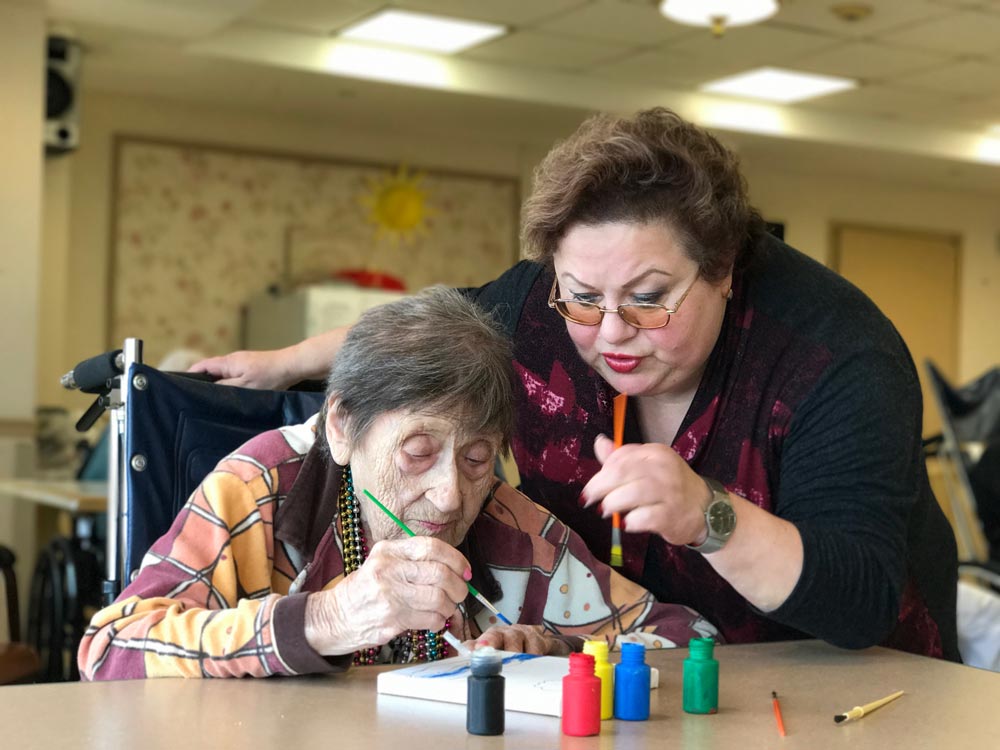Memory Care Facilities Charlotte: Producing a Secure and Nurturing Community
Wiki Article
How to Provide Customized and meaningful Dementia Treatment
The stipulation of tailored and meaningful dementia treatment calls for a nuanced understanding of each person's distinct background and preferences. Care methods must be tailored to engage the person in means that reverberate with their past experiences, therefore promoting emotional links and improving total health.Comprehending Mental Deterioration Uniqueness

Treatment companies should evaluate cognitive abilities, emotional states, and behavioral patterns to produce personalized care strategies. This may consist of adjusting interaction designs, using acquainted routines, and using purposeful tasks that reverberate with the person's past experiences. For example, engaging a person with an enthusiasm for songs through musical tasks might stimulate positive memories and boost psychological health.
Furthermore, understanding originality cultivates a thoughtful method that appreciates the self-respect and freedom of those coping with mental deterioration. It motivates caretakers to pay attention proactively, observe behavioral hints, and stay versatile in their caregiving approaches (memory care facilities charlotte). By prioritizing individuality, caretakers can not only improve the lifestyle for those with mental deterioration however also develop an extra profound understanding of their one-of-a-kind point of views, eventually resulting in a lot more efficient and understanding care
Building Count On and Rapport
Developing trust fund and rapport is fundamental in dementia care, as it creates a supportive and secure environment for individuals affected by the problem. Building these links calls for consistent, caring interactions that focus on the requirements and sensations of the individual. Caretakers should approach interactions with empathy, identifying the one-of-a-kind difficulties faced by those with dementia, including amnesia, confusion, and emotional distress.Caretakers need to use clear, straightforward language and non-verbal cues to convey understanding and support. Energetic listening shows respect and validation, enabling individuals to share themselves without anxiety of judgment.
Familiarity with everyday tasks and caregivers advertises a feeling of security, making it possible for people to feel even more at simplicity. By doing so, caretakers reinforce the individual's identification, promoting dignity and respect, ultimately leading to more powerful, much more purposeful relationships in the context of mental deterioration care.
Tailoring Tasks and Engagement
Engaging people with dementia via customized tasks can substantially enhance their lifestyle and promote a deeper link in between caretakers and those in their treatment. Customization is essential, as it recognizes the unique backgrounds, interests, and abilities of each person. Tasks must be created to boost cognitive functions, advertise physical motion, and encourage social communication, all while continuing to be satisfying and satisfying.To tailor activities efficiently, it is crucial to evaluate the individual's choices and cognitive capacities. For instance, some may find pleasure in horticulture, while others might value songs or art. Simple, acquainted tasks can evoke favorable memories and offer a feeling of success. In addition, including elements of routine can offer comfort and security, enabling individuals to engage with tasks more confidently.
Caregivers can boost interaction by participating together with the people, promoting an interactive and supportive atmosphere. It is also crucial to stay adaptive and adaptable, adjusting activities as needed based on the individual's energy levels and mood. Eventually, purposeful engagement with tailored activities not just boosts individuals with mental deterioration but also enriches the caregiver connection, advertising shared satisfaction and understanding.
Efficient Communication Strategies
Efficient communication is essential in mental deterioration treatment, as it promotes a feeling of connection and understanding in between caretakers and people experiencing cognitive decline. Using efficient interaction techniques can substantially boost the top quality of interactions and lower stress for both celebrations.Firstly, making use of basic, clear language is essential. Brief sentences and acquainted words help people comprehend and respond better. Furthermore, preserving a calmness and favorable tone can produce an encouraging atmosphere, which is important for people who might really feel anxious or overwhelmed.
Non-verbal communication plays a considerable duty as well. Caregivers ought to pay interest to body language, facial expressions, and gestures, as these hints can usually convey more than words - memory care charlotte. Developing eye call and using mild touch can also communicate and reinforce links empathy
Energetic listening is an additional key element. Caregivers ought to be mindful, allowing people to reveal themselves completely, also if their speech is unclear or fragmented. This lionizes and urges extra open communication.
Last but not least, confirming feelings and experiences is crucial. Recognizing emotions, regardless of their basis in reality, can provide comfort and reinforce the caregiver-individual connection, promoting a much more supportive environment.
Sustaining Family Involvement
Household participation plays a considerable function in the general care and support of individuals with mental deterioration. Involving relative produces a joint atmosphere that improves the quality of treatment, cultivates psychological connections, and makes sure that the unique requirements of the person are fulfilled. Relative typically have invaluable insights into the person's history, preferences, and behaviors, which can be critical in creating personalized care methods.
Additionally, family members can be urged to take part in everyday treatment tasks, such as taking part in meaningful discussions or assisting with acquainted routines. This not just helps endure the individual's feeling of identity however additionally strengthens domestic bonds. Inevitably, by fostering a comprehensive method that values family members contributions, care providers can improve the total experience for both people with dementia and their loved ones.
Final Thought
In final thought, providing significant and personalized dementia care requires a thorough understanding of each person's one-of-a-kind history and preferences. Jointly, these methods contribute to boosted quality of life for individuals with dementia.
The provision of tailored and purposeful mental deterioration care requires a nuanced understanding of each individual's unique background and choices. By doing so, caretakers reinforce the person's identity, promoting self-respect and regard, eventually leading to stronger, more purposeful connections in the context of dementia care.
Engaging individuals with mental deterioration with tailored tasks can substantially enhance their quality of life and cultivate a deeper connection between caregivers and those in their treatment.Family members involvement plays a significant duty in the general care and assistance of individuals with dementia. Inevitably, by fostering an inclusive technique that values household contributions, treatment providers can enhance the total experience for both people with mental deterioration and their liked ones.
Report this wiki page